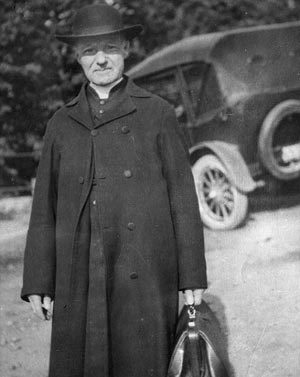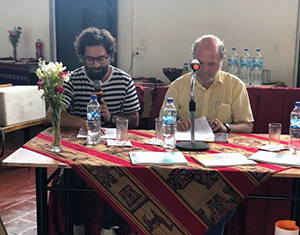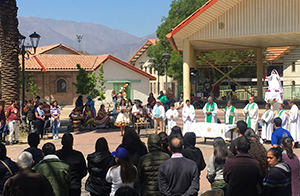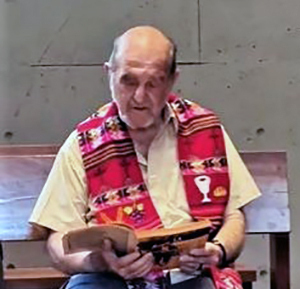
Today, as we say "thank you, André,” we are in communion with the multitude of the needy who go on pilgrimage to Saint Joseph’s Oratory in Montreal, Canada. God filled with grace this poor man, Brother St. André. He cultivated what is usually called spirituality of solidarity. He did not walk the pious route of the dominant sectors of his time. In the Christianity of Latin America, Brother André’s healing and prayer stand out.
A healing practice …
In every corner of Latin America, there are popular healing agents: people who heal in the neighborhoods of our cities; pakos and yatiris in Quechua and Aymara communities; indigenous doctors in the tribes of the jungle; health agents in the Candomblé and umbanda religions of Brazil; the hungans of the Haitian voodoo; and people who heal in Mexico and among the native peoples of North America.
First, health promoters belong, for the most part, to socially and culturally neglected populations. For centuries they have transmitted the admirable medical and spiritual wisdom of communities that have their own strengths to solve their problems. Secondly, its therapeutic practice is disqualified and persecuted by the "official" system of medicine (which has never benefited all suffering people). Thirdly, it is an integral health practice, since, together with the physical ailment, it covers the patient’s affective spiritual experience, and in some cases includes an awareness of the social causes of the illness.
In studying the trajectory of Br. André, one finds clear signs of his peculiar placement in this healing perspective of the poor. During the 40 years that he was a janitor at Notre Dame College and later, as guardian of the Oratory until his death, he devoted most of his time to caring for the sick poor. His treatment consisted of rubbings with the medal and oil of St. Joseph, along with giving comfort and advice.

This activity was despised by the “honorable” parents of the school (whose authorities forced Brother André to attend to the sick in a small house separate from the school).
Doctors and state health authorities attacked the healing work of this "ignorant" brother. In addition, there was criticism from pious people against the supposed immorality of touching the patient’s body with the oil and medal of St. Joseph.
We see here the traditional service that a poor person generously gives to other poor people, with the wisdom and faith that characterizes them. It is an integral health service, attending spiritually and materially to the people. It is a ministry that privileges the health of the oppressed and seeks the renewal of their religiosity. We also see the conflict suffered by those who act outside the hegemonic system (which disqualifies the science and spirituality of the humble).

Finally, we see in Brother André the beautiful evangelical tradition of opting for the poor, particularly in the field of healing, by invoking the efficacious grace of God that saves people in need.
A prayerful practice......
The “little people” of Latin America have a great prayer life. Incessantly and humbly, they cry out to God and Mary and to their holy protectors. They plead for their pressing needs and give heartfelt thanks for the strength and miracles they receive. They seek forgiveness for their sins and reconciliation with their fellow men and women. They contemplate in silence and with tears. They celebrate with their music and dances. They make pilgrimages to sacred places to be revitalized.
These and other expressions are different from the spirituality of affluent people. In fact, most of the poor have an experiential and responsible prayer. They develop it in their history, in the face of material and social problems, amid their communities. There they recognize miracles, which are neither substitutes nor evasions of human responsibility.

They pray concretely with their own means: novenas, rosaries, processions, Stations of the Cross, pilgrimages, worship with images, and religious feasts. All this is assumed and reoriented evangelically in pluriform communities, where the Word of God manifests its liberating power.
Prayers for the Intercession of St. André Bessette
Now, what was Brother St. André's prayer like? He learned in his family to pray with intensity and sincerity (as happens in so many families). From his own condition as a young worker, as a man who hoped in the salvation that passes through suffering, he developed an immense love for Jesus Crucified and St. Joseph, the carpenter.

After entering the Congregation of Holy Cross, he faithfully assumed the way of praying in community and the practices of mortification and piety of his time. It is worth noting that Br. André reintegrated himself into the religious forms of the poor: the Way of the Cross, novenas, the rosary, pilgrimage, and the prayer for health. In this way he prayed with the poor who came to him. His ministry was inserted in the religiosity of the poor and from there, he communicated the Gospel of the mistreated Jesus, who is the only Savior.
This reflection on Saint André Bessette, the first canonized saint in the Congregation of Holy Cross is a translated, abridged version of a longer reflection originally written by Fr. Diego Irarrazaval, C.S.C., in Spanish. Fr. Irarrazaval is a member of the District of Chile-Peru, where he has served in a number of ministries over the years and is known for his writings in liberation theology.